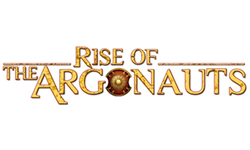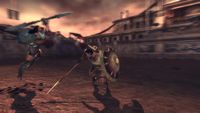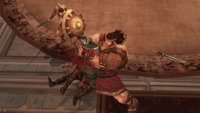|
|

|
PLATFORM
|
Xbox 360
|
BATTLE SYSTEM
|

|
INTERACTION
|

|
ORIGINALITY
|

|
STORY
|

|
MUSIC & SOUND
|

|
VISUALS
|

|
CHALLENGE
|
Adjustable
|
COMPLETION TIME
|
Less than 20 Hours
|
|
OVERALL

|
+ Engaging story.
+ Story choices affect skill development.
+ Execution finishes are wonderfully brutal.
- Controls are awkward and stiff.
- Many technical problems.
- Minimalist interface lacks the most basic gameplay tools.
|
Click here for scoring definitions
|
|
|
It's very rare for a story to become so eternal that it is remembered for centuries. Only a handful of writers can claim this, and of all of them, none are more remembered than the epic poets of ancient Greece. Jason and the Argonauts is one such tale, the story of the brave king of Iolcus who united the many heroes of Greece in a daring quest to recover the fabled Golden Fleece. Rise of the Argonauts, developed by Liquid Entertainment, is a brand new take on the old myth, and while it doesn't follow its inspiration precisely, the new tale is every bit as memorable.
Like the original story, Rise of the Argonauts stars Jason, king of Iolcus, but it almost immediately diverges with a new twist and new motivations. As he is saying his vows, his bride to be, princess Alceme of Mycenae, is murdered by a group of assassins. Vowing to restore her life at any cost, Jason sets out to speak with the Oracle at Delphi, and there learns that the means for what he seeks lies with the Golden Fleece. With the massive ship, the Argo, at his command, an epic adventure follows, bringing him face to face with centaurs, satyrs, gods, kings, and many other heroes who accompany him on his journey. All the while, a cult of assassins lurk in the shadows, waiting to strike.
The story of Rise of the Argonauts is one of its few claims of glory. It is well-told and filled with adventure and excitement. The characters are likeable, if somewhat one-dimensional (aside from Jason), but their motivations are always clear, and their personalities mesh well together. The locales are varied and each has a unique, interesting sub-story to fill out the player's time there while furthering the main plotline. The greatest feature of the story, however, is the role it plays in the gameplay itself.
Make no mistake: Rise of the Argonauts is a very story-driven game. At least two thirds of the fifteen hour game is spent exploring and furthering the storyline, but thankfully it involves the player to a large degree, making it a lot of fun and surprisingly addictive. The developer was clearly influenced by BioWare's recent sci-fi RPG, Mass Effect, as the dialogue trees presented by Rise of the Argonauts mimic the former in both form and function, right down to the controls. However, conversations have a decidedly more important impact on the way the game is played, due to the way they interact with the game's skill system.
 Achilles and Jason do battle in the Mycenaen arena.
Achilles and Jason do battle in the Mycenaen arena.
|
|
Unlike most RPGs, Rise of the Argonauts does not have experience points in the traditional sense. Jason does not gain levels as the game progresses, and killing enemies, for the most part, does not award him with any tangible benefit. Instead, virtually all conversation options are aligned with one of the game's four patron gods: Ares, Apollo, Hermes, or Athena. These choices mirror the sentiments of the gods. Ares believes that one should have honor in all actions and generally provides more aggressive options. Apollo believes in morality and duty above all else and usually provides the kindest options. Hermes favors those with cunning and guile, allowing Jason to use trickery, wit, and humor. Finally, Athena believes in justice, and the options she offers generally lie somewhere between those of Ares and Apollo.
This isn't a morality system, per say, as none of the gods are truly evil; they simply have different values. The effect they have on different events will often be fairly significant, but Jason's ultimate goal always remains the same. What makes it truly interesting, however, is that as Jason bases his actions on the values of different gods, he gains favor with them. If he gains enough favor with a particular god, he receives a divine blessing, allowing him to select a new ability from the associated skill tree. Jason can also receive favor from the gods by dedicating his heroic deeds to them, which are acquired by completing main quests, side quests, and sometimes by killing enough enemies or killing enemies in certain ways.
The main point of enhancing one's skills, of course, is to improve Jason's abilities in combat. The combat system plays out much like a typical action game in the vein of God of War. Unfortunately, while the system is sound in concept, awkward, stiff, and sometimes unresponsive controls leave it feeling mostly mediocre, although it offers enough action and options to keep the player thoroughly engaged. Jason has three weapons he can wield and switch between: a spear, a mace, and a sword. These weapons are balanced in a rock, paper, scissors manner. The mace is most effective against sword-wielding enemies, the sword is strong against spearmen, and the spear is strong against mace-wielders.
Jason has two basic types of attacks with each weapon, a weak combo attack and a strong execution attack, which, if fatal, tends to mutilate enemies in particularly vicious ways. Jason can spear an enemy and toss him over his shoulder, he can slice an enemy in half at the waist, or simply knock off the enemy's head with a well-aimed mace strike. Jason can also switch weapons in mid-combo, leading to other bloody finishing maneuvers. In addition to his weapon, Jason always carries a massive shield, which he can use to block incoming attacks or knock enemies away. With all these options available, the player should have no problem creating his own fun during combat, particularly since the game generally isn't very hard. When Jason's health drops to critical levels, he enters a "state of grace," during which time he can regenerate health so long as he avoids taking damage. Unfortunately, the awkward and unresponsive controls often get in the way of what the player might want to do.
 Hercules is massive, and puts his size to good use.
Hercules is massive, and puts his size to good use.
|
|
In addition to his melee combat specialties, Jason can also learn to use god powers. There are several god powers for each of the four patron gods, but Jason can only have four hotkeyed at any one time. These god powers tend to be rather powerful, but sadly, they are very situational, and using them is rarely necessary. God powers can only be used every so often, however, so overusing them might not always be a great idea if they aren't there when they're needed most.
Adding to the problems is the game's HUD, or lack of one to be more specific. Rise of the Argonauts, by default, has no head's up display whatsoever. Visual cues from Jason's body provide basic information such as health and which weapon is equipped, but not terribly well. Jason is far enough away from the camera that the scars providing health information are difficult to see and aggravating to focus on during combat. Thankfully, an option exists to turn on a simple health bar, which does wonders for making the game more enjoyable. However, the game still lacks two very basic features that are sure to frustrate many players: a minimap and a compass. With neither of these present, the player must constantly open the menu to look at a map just to get his bearings, and it quickly becomes aggravating.
Rise of the Argonauts's biggest issues stem from technical problems throughout the game, mostly with the graphics. Occasional texture popping, sudden framerate drops, and goofy shadows are just some of the issues that pop up on a regular basis. Thankfully, most of these problems only occur immediately after a loading point, and they never occur during combat, which keeps them from affecting the gameplay to any significant degree. Despite its technical issues, the graphics of the game are actually quite good. The art design is terrific, and each area is distinct and detailed. The character designs have a lot of personality, particularly the bulging, lumbering Hercules, who appears very different from how he is conventionally portrayed. The audio is also well done, though generally not amazing. The voice acting is average, for the most part, faltering occasionally but generally working quite well. The music adds to the game's atmosphere wonderfully, featuring an epic score appropriate to the quest it accompanies.
Rise of the Argonauts is a difficult game to judge, mainly due to its backwards design. The majority of the game is spent engaged in the story rather than the combat, which is unusual for a game of its type. If a strong story based in ancient myth is something you'd enjoy, Rise of the Argonauts is not likely to disappoint. However, those seeking an action-packed, gory adventure will likely find the story focus to be a turn-off rather than a highlight. The game is also quite short, wrapping up after less than twenty hours, sidequests included, which makes it fairly pricey for the playtime it offers. There are also multiple difficulty settings, but even on medium difficulty, the final boss is the only one likely give the player any real trouble. All things considered, Rise of the Argonauts is a good game that could have been a lot better. Players should consider what they want out of it before purchasing.
Review Archives
|









